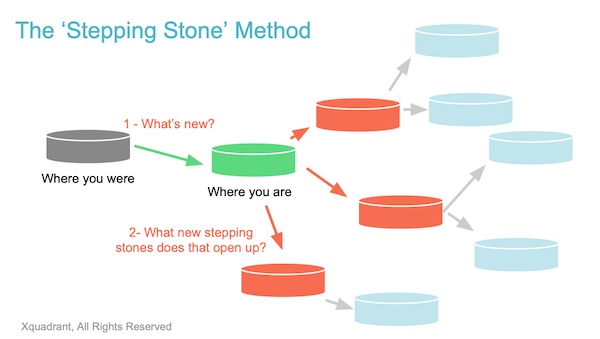Received wisdom states that to proceed in life and business, we need to set objectives and work towards them.
This prevalent mindset starts from our earliest days, where we are encouraged to set ourselves objectives in school, such as achieving A grades, and set to work pursuing them.
It's the same in business, where goal setting is an integral part of every manager's remit.
But what if objective setting is best suited only for incremental improvements?
There is considerable evidence to suggest that goal setting is great for when you want to increase sales by 10% or improve your grades from B to A, following some other proven process. But what about when you want to create a breakthrough or something that is game-changing?
In the fascinating book, "Why Greatness Cannot Be Planned: The Myth of the Objective," Kenneth Stanley and Joel Lehman make a very strong case that great achievements can't be bottled up into mechanical metrics.
Great achievements require unexpected stepping stones
Most great achievements stand on the shoulders of what at first would seem to be unrelated discoveries.
For example, aviation would not have been possible without engines, and engines would not have been possible without the induction coil. However, nobody designed the induction coil with the view to creating an engine, and nobody invented the engine with the view to manned flight.
Similarly, the birth of computing depended on vacuum tubes, but nobody was anticipating computing when they discovered and refined vacuum tube technology.
In fact, breakthrough innovations turn out to be “accidental”. The inventors were focused on something else, until it became apparent that something unexpectedly new was just one step away.
For example:
3M - Post-it Notes
The invention of Post-it Notes was a result of an accidental discovery of a low-tack adhesive by 3M scientist Dr. Spencer Silver. The product gained immense popularity and became a staple in offices worldwide.
Pfizer - Viagra
Originally, Pfizer was working on a drug called sildenafil to treat angina, but during clinical trials, it was found that the drug had a side effect of inducing erections. Pfizer then shifted the drug's focus and marketed it as Viagra, a medication for erectile dysfunction.
Coca-Cola
Coca-Cola was initially invented by pharmacist John Pemberton as a medicinal syrup for headaches and fatigue. However, after mixing the syrup with carbonated water, the concoction became a popular beverage, leading to the creation of the Coca-Cola Company.
Corning - Gorilla Glass
Gorilla Glass, a highly durable glass material now commonly used in smartphones and tablets, was the result of a 1950s experiment gone wrong. When trying to create a new type of glass, a scientist at Corning accidentally overheated a batch of glass, creating a stronger, more durable material.
Dyson - Cyclonic Vacuum Cleaner
James Dyson was trying to improve a process for spraying a previous invention with powdered paint. He became frustrated by the way excess powder would get caught in the calico cloth behind the product and become clogged. He later decided to apply his solution concept to vacuum cleaners, revolutionising the industry.
Our own lives
If we look at our own lives, we often find that the biggest breakthroughs were also unexpected.
Redefining the path to success
The reality is that if we measure progress towards some huge goal and continuously try to increase that indicator, we are likely to be led astray.
For example, if we want to make a lot of money, it doesn't necessarily make sense to take the highest paying job or push for a promotion in our current job. Instead, we might find that spending a couple of years on unpaid research in a new technology or mentoring a famous entrepreneur might be better paths forward. If you always focused on maximising the indicator of “money in the bank” you’d never get to your ultimate goal!
We see this at play in business all the time. Investors, seeking to create a big jump in corporate valuation, focus on increasing valuation every single year, very often leading to shortsighted cost-cutting that undermines the long-term success of the business.
In other words, when it comes to breakthrough objectives, the path to success often involves seemingly going backward and taking steps in the opposite direction.
Imagine you are in a maze. If you determine you want to get to a certain point within the maze, and were making decisions based on a GPS tracker that showed your “progress” (i.e. distance to the goal), you would never be able to arrive at your destination. You would end up in some kind of dead-end, and would actually need to some way FURTHER AWAY from your goal in order to make progress.
The measurement of progress towards a vastly ambitious objective, then, is a “false compass.”
Embracing the Stepping Stone Method to maximise impact
Regular readers will know that I'm all in favour of maximising and multiplying impact and making a big difference. So you may be surprised at this perspective. Am I saying that we should just drift along in life?
Absolutely not. We can remain committed to the idea of making the biggest impact we can on our business, our people, and the world. But we may want to hold more lightly the path to get there.
Instead of defining a couple of success metrics and relentlessly pushing towards those, the book suggests another path that is worth serious consideration: the stepping stone strategy.

To apply the Stepping Stone Method, stop thinking about how to get to a specific huge goal, and start thinking what bold and interesting moves you have available to you right now.
Practically:
Applying the Stepping Stone Method
Let me apply the Stepping Stone Method personally, and talk about two CEO clients who did the same exercises recently.
On a personal level, this year I:
These are just three areas in my life and business that are new and offer me new jumping-off points to maximise my impact even further. For example, based on the “novelties” above, two possibilities that open up for me are to:
One of my CEO clients realised that a recent acquisition had not only created new scale and cash flow, but new credibility and gravitas with certain investor groups that would, if leveraged, allow him to accelerate his business development.
Another discovered that the new product launch opened up a bunch of possibilities to engage at a deeper level in the C-Suite of their customers, the potential to provide unique data in the market, and the opportunity to create industry awards and a new level of buzz around their brand.
Can you see how the stepping stone approach creates more practical and valuable opportunities than arbitrarily picking a huge goal and doggedly measuring progress towards it?
But what about my ‘moonshot’?
What about ‘moonshots’? Aren’t they the refutation of this argument? If huge objectives don’t “work”, what happened in the 1960s when the USA managed to put a man on the moon?
The answer is that it turned out that putting a man on the moon was just about technically possible at that point in history - all the necessary stepping stones were in place. But imagine the same feat had been attempted 50 or 100 years earlier - it would have been doomed to failure no matter the budget that was thrown at it.
So have a look at your moonshot. It might be that all the elements are in place and the challenge is simply to pull them together. For example, the miniaturisation of electronics + widespread computing + CDs + MP3 technology enabled the iPod.
But, if your moonshot is akin to “shooting for the moon in the 1840s” then it might be worth stopping and looking to explore a stepping stone that’s just one leap away and see where that takes you instead.
Conclusion: Pursue bold and interesting leaps, but beware of the ‘false compass’
This might seem heretical. After all, our entire culture seems built on the importance of objectives. I’d recommend reading the book for a fuller picture, but here’s the important thing to remember.
In conclusion, while setting goals can be an effective method for achieving incremental improvements, it’s a flawed and deceptive approach for making breakthroughs or game-changing progress.
Measurements of “progress” become “false compasses” when the stepping stones don’t yet exist - because the very stepping stones we need are unlikely to be discovered on the linear path to these big goals.
Instead, by adopting the Stepping Stone Method and remaining open to new possibilities, we can better position ourselves to achieve long-term success and make a lasting impact on the world around us.



